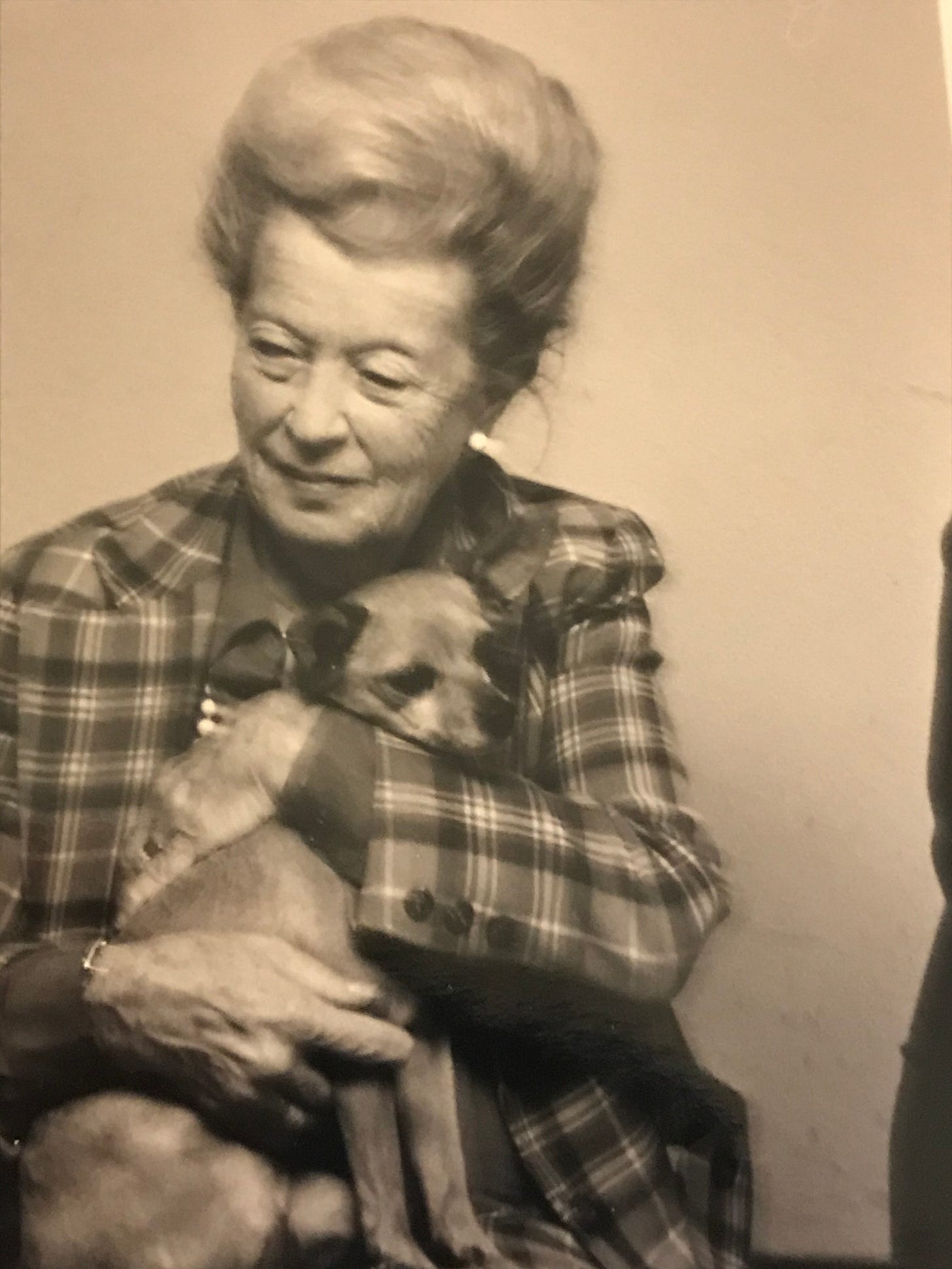My mother, already fifteen years gone, is slipping further away from me. In February 2016, I wrote a piece called “Living Arrangements,” in which I imagined her occupying my body, “my osteoporotic spine bending to accommodate hers.” Back then, it felt as if her ghost had “moved its furnishings into my body,” just as I set up house inside her in 1945. She was then, on the brink of Hiroshima, “a warm, dark, wet tenement.” A safe place, I guess. But something changed during covid. She packed her bags and moved out.
My mother outlived my father by twenty-eight years and for a long time I felt her presence viscerally while he had become a vague blur in a fedora. When she began to recede, I thought maybe that’s just the way it works. You can only hang on to them for so long before they fade like lilacs under a hot sun. I go through piles of old photographs and watch her grow from a lively schoolgirl, always the prettiest in any group, to a swan-like, seemingly self-assured young woman. I see her on her honeymoon in Atlantic City, all done up in a coat with a fox collar. But somewhere along the line, she becomes a caricature. When I look at her, I see the hair swept up on top of her head, the magenta lipstick and cobalt eyeshadow, but I don’t know the person behind the facade. I am not in touch with her losses, her yearning, her desire. My mother never left the house without girdling herself, straightening her seams, powdering her nose. In that outfit, she couldn’t get down on the floor to tickle a small child. She couldn’t acknowledge pain, either hers or yours.
During the pandemic, I lost my taste for the received wisdom of who she was, the way some covid patients lose their ability to taste and smell. I began to feel that each of us had done an injustice to the other’s narrative. My mother’s father died when she was sixteen. This seemed to be the origin of her “put a good face on it” story. She gave up on her academic diploma and any hope of going to college. She took up stenography, practiced those little shorthand squiggles that look like Arabic script. When she finished high school, she went straight to work in an office in lower Manhattan, wearing her best shoes. Her idea of what to do when you met suffering was to declare it “a phase.” This is somehow not the same as encountering impermanence which I now reflect on during meditation. When I contemplate impermanence, I see that all things, all people, me and my mother, will die. I begin to know that nothing is forever, neither desert heat nor arctic frost, neither sadness nor joy. But when I become aware of my own experience, I want in that moment to notice it, to name it, and from time to time to share it. I do not want it to be regarded as meaningless, unworthy, a trifle, a phase.
I don’t know why the inadequacy of this “it’s just a phase” operating principle became more obvious to me during covid, but it must have had something to do with my sense that the life we were all leading seemed interminable, like a nuclear winter. And where was she, my mother, through the long months of isolation and anxiety, all those months when I couldn’t see my grandchildren? Dead, of course, her ashes buried next to the hostas and astilbe behind the house. She did not protect me over the last year as a mother should. She did not impart any wisdom. But she did leave instructions for how to make my Aunt Ella’s Sour Cream Cake. “Dear Susie,” it said. “Mix 1 tsp. Baking Soda and 1 cup sour cream. Set aside for 15 minutes.” I love that archaic women’s magazine “set aside.” I found the recipe, typed in an old font on a piece of faded off-white notepaper with a blue raindrop border on the left, while rifling through my file looking for salmon croquettes. At the bottom, it said “I got great pleasure from your visit. The whole week-end was wonderful, but I miss you so much more now. Give my love to Frank and the boys. I think of you all constantly.”





Thank you, Laura. These situations are complicated and don't lend them selves to simple explanation. In fact, I try not to explain at all....Rather just suggest the various layers of experience.
Loved this, so complicated, moms and daughters, wow! I love your writing, your mind, your memories and the practiced way you express.